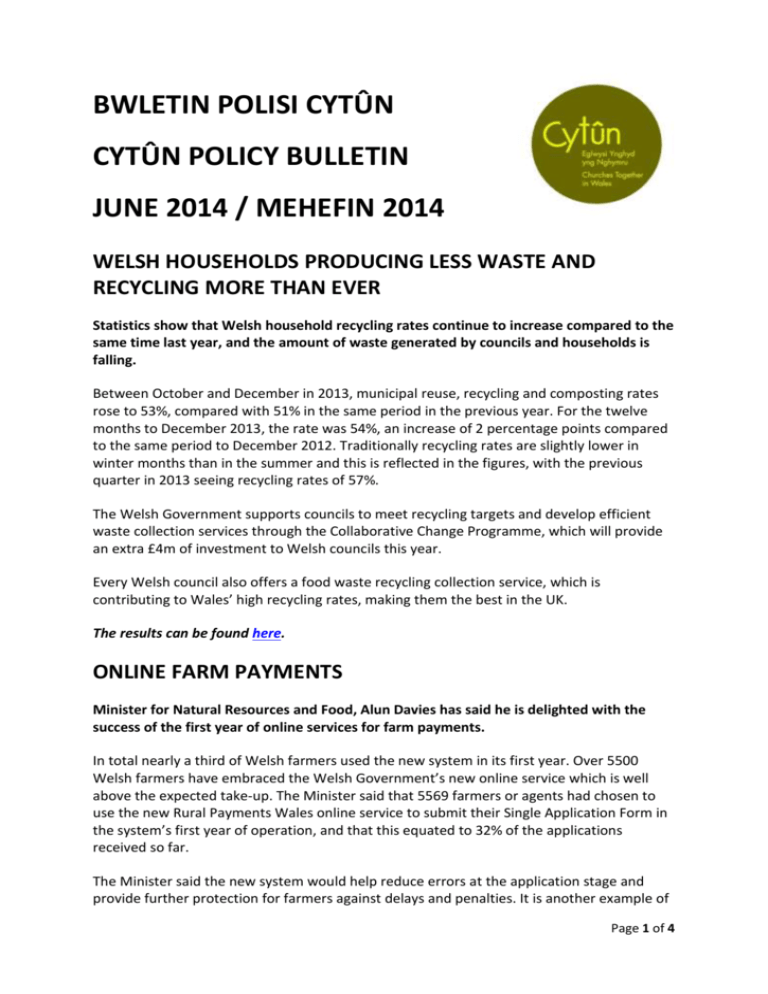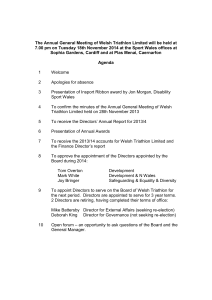Cytûn Policy Bulletin
advertisement

BWLETIN POLISI CYTÛN CYTÛN POLICY BULLETIN JUNE 2014 / MEHEFIN 2014 WELSH HOUSEHOLDS PRODUCING LESS WASTE AND RECYCLING MORE THAN EVER Statistics show that Welsh household recycling rates continue to increase compared to the same time last year, and the amount of waste generated by councils and households is falling. Between October and December in 2013, municipal reuse, recycling and composting rates rose to 53%, compared with 51% in the same period in the previous year. For the twelve months to December 2013, the rate was 54%, an increase of 2 percentage points compared to the same period to December 2012. Traditionally recycling rates are slightly lower in winter months than in the summer and this is reflected in the figures, with the previous quarter in 2013 seeing recycling rates of 57%. The Welsh Government supports councils to meet recycling targets and develop efficient waste collection services through the Collaborative Change Programme, which will provide an extra £4m of investment to Welsh councils this year. Every Welsh council also offers a food waste recycling collection service, which is contributing to Wales’ high recycling rates, making them the best in the UK. The results can be found here. ONLINE FARM PAYMENTS Minister for Natural Resources and Food, Alun Davies has said he is delighted with the success of the first year of online services for farm payments. In total nearly a third of Welsh farmers used the new system in its first year. Over 5500 Welsh farmers have embraced the Welsh Government’s new online service which is well above the expected take-up. The Minister said that 5569 farmers or agents had chosen to use the new Rural Payments Wales online service to submit their Single Application Form in the system’s first year of operation, and that this equated to 32% of the applications received so far. The Minister said the new system would help reduce errors at the application stage and provide further protection for farmers against delays and penalties. It is another example of Page 1 of 4 the Welsh Government’s positive response to Gareth Williams’s Working Smarter review, which aims to reduce bureaucracy for farmers in Wales and allow them to focus on the business of farming. The Minister said he expected all CAP payment application processes to be available online only by 2016 and would make sure the necessary support was available to prevent anyone from being left behind in the move to online services. He also said local clinics would be set up so that farmers could access the new system in a supported environment and benefit from hands-on training. £1BN OF INFRASTRUCTURE INVESTMENT ANNOUNCED Welsh Finance Minister Jane Hutt has set out details of a £1bn investment into major infrastructure projects between 2017-18 and 2021-22. The funding has the potential to create 6,500 jobs, provide a sustainable boost to the Welsh economy and will be undertaken using new innovative investment models. Cuts in public expenditure have seen the Welsh Budget cut by 10% since 2010. The Welsh Government has been trying to develop new and innovative methods of financing infrastructure investments, including the £340 million Local Government Borrowing Initiative and the £125 million Housing Finance Grant. The Welsh Government will be supplementing its capital budget with direct borrowing and revenue-funded innovative financial instruments to invest in a number of major priority schemes, as set out in its Wales Infrastructure Investment Plan (WIIP). The new investments include: A465 Sections 5&6 (Dowlais Top to A470 Junction and A465 / A470 Junction to Hirwaun) - £300m: This investment means that the whole of the A465 is expected to be dualled by 2020. A new Specialist Cancer Care Centre, enhancing the capacity of the Velindre Trust £210m: this will enable the construction of a brand new hospital to provide cancer patients with access to high quality services comparable with the best in the world. The Welsh Government will also be making full use of the £500m of direct borrowing that Ministers will, in the future, be able to undertake as a result of the Wales Bill. Since its publication, the WIIP has provided additional infrastructure investment totalling around £2 billion – including investments in Next Generation Broadband, 21st Century Schools, and Flood and Coastal Erosion Risk Management, as well as investments providing financial support for SMEs, housing, and domestic energy efficiency. Over the ten year period between 2012 and 2022 – the Welsh Government will have boosted funding for infrastructure by around 9% each year. Page 2 of 4 NEW CANCER WAITING TIMES PILOTED A pilot project to test new ways of measuring cancer waiting times in Wales are underway, the Welsh Government has announced. A single cancer pathway will be piloted, measured and compared against the existing system. Currently, patients are placed on one of two pathways – a 62-day ‘urgent’ pathway or 31-day ‘non-urgent’ pathway, according to when their cancer was first diagnosed. The new measures, which have been developed by cancer clinicians, will be tested in six health board areas in Wales and will help the NHS to gain a more accurate picture of actual waiting times and speed up treatment in many cases. The pilot started on May 1st and will run until September 30th. Performance against the current 31-day and 62-day targets will continue to be measured and reported as normal. MAJOR TRANSFORMATION OF SOCIAL SERVICES IN WALES TO HAPPEN IN 2016 A radical new law that will transform the way social services are delivered in Wales will be switched on in April 2016, Deputy Minister for Social Services, Gwenda Thomas has announced. The Social Services and Well-being (Wales) Act 2014, which received Royal Assent last week, will transform the way in which social services are delivered through a focus on achieving results that are necessary to promote the welfare of the person - as an individual, as a family and as part of a community. The Act introduces, for the first time, a strong statutory framework for the protection of adults and has provided for strong national leadership arrangements for safeguarding people. It will also ensure people have access to clear information, advice and assistance and will place their voice and rights at the centre of decisions about their care and support. The Deputy Minister announced that a new Bill to reform the regulation and inspection regime in social care in Wales will be introduced before the National Assembly in February 2015. The new Regulation and Inspection Bill will refocus the regulation of social care towards outcomes for people. STRONGER LAWS ON CHILDREN’S RIGHTS COME INTO FORCE New legal duties on the Welsh Ministers to consider the rights of children when exercising any of their functions, including making spending decisions, creating policies or changing the law, have come into force. Page 3 of 4 In 2012 Wales became the only nation in the UK and one of the few countries in the world to adopt the United Nations Convention on the Rights of the Child (UNCRC) when Assembly Members unanimously voted for the ground-breaking Rights of Children and Young Persons (Wales) Measure 2011. The Convention is a human rights treaty which sets out the civil, political, economic, social, health and cultural rights of children under the age of 18. Under the treaty children are considered a vulnerable group who need additional rights to ensure they are protected and can participate in matters that affect them. Since the vote in 2012, Welsh Ministers only had to consider the UNCRC when developing new policies or legislation and/or amending existing ones. With the advent of the additional new legal duties coming in to force today, Welsh Ministers now have to go even further and consider the rights of children when exercising any of their functions, from deciding budgets, to developing policy and giving guidance to public bodies. The Welsh Government has put in place a Children’s Rights Scheme to reflect these new arrangements and ensure that they comply with the duty set out in law. GERAINT HOPKINS SWYDDOG POLISI CYTÛN – EGLWYSI YNGHYD YNG NGHYMRU 029 2046 4378 geraint@cytun.org.uk Page 4 of 4






